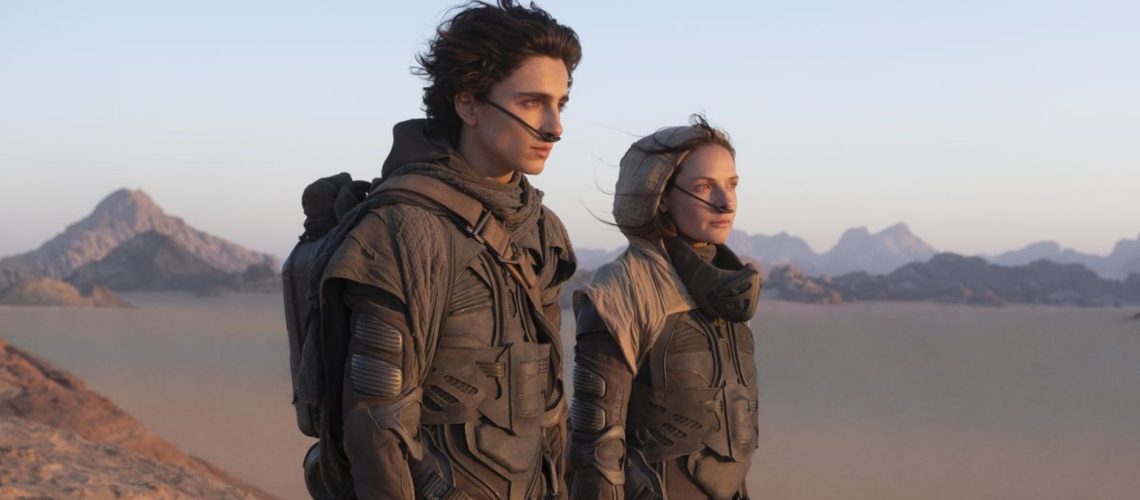You can’t really escape from Dune. Generally cited as the highest-selling science-fiction book of all time, the fingerprints of Frank Herbert’s 1965 epic space fantasy can be felt through media to this day.
There’s the obvious influence it had on Star Wars by infusing fantasy into a sci-fi setting – ancient prophecies and heroic master swordsmen living alongside space travel and impossible technology. There’s the thematic inspiration the book’s topics of ecology and environmentalism had on Hayao Miyazaki’s Nausicaä of the Valley of the Wind. I’ve not even touched on the sandworms yet, an image so captivating you can find it almost everywhere, from Tim Burton to Spongebob Squarepants. My first exposure to Dune came from the sandworms popping up in an old Star Wars PC game my family computer struggled to run
Despite the visuals on offer, as well as the rich Shakespearean story of feuding space nobility, attempts to translate the book into film have almost always fallen flat, owing to a variety of issues relating to the sprawling storyline and the truly bizarre and alien setting.
Alejandro Jodorowsky’s attempt in the early 1970s was an infamous disaster, with a script the size of a phonebook, a proposed length of 14 hours, and a cast including Mick Jagger, Salvador Dalí, and a robot replica of Dalí (to save money on hiring the real man full time). Its legacy lives on through the fascinating concept art that would inspire sci-fi imagery for years to come.
The enduring pop culture vision of Dune can likely be found in David Lynch’s 1984 adaptation, a film so plagued by studio interference and poorly conceived ideas on how to translate prose to screen that Lynch tried to have his name taken off of it. As such, Dune was for decades relegated to the shelf of unfilmable books and Hollywood what-ifs? Too strange, too large in scope and too sprawling to really find its place in film. Being best remembered as “that one with all the worms” (my mum’s words, not mine). Of course, it’s important to remember that people once said the same things about The Lord of the Rings (minus the bit about worms).
With all this in mind, director Denis Villeneuve has essentially pulled off a miracle. He’s managed to adapt Dune in a fashion that is manageable and not alienating to outsiders while retaining the inspiring and otherworldly visuals of the setting.
The story is easy to follow but not simplified, it doesn’t feel like the movie is holding your hand. While the Lynch adaptation told its story and established its setting through meandering narration, Villeneuve and screenwriters Eric Roth and Jon Spaihts easily weave exposition into the dialogue, making the smart move to jettison explanations that are unnecessary or that the audience can figure out themselves.
The story of Dune centres on Paul Atreides, the young son of a noble family in an interstellar empire, which bears stronger similarities to a feudal monarchy than would be expected given the far future setting.
Paul’s family is assigned stewardship of the desert planet Arrakis to oversee the extraction of the resource melange (referred to as spice), which not only grants longer life and increased mental abilities but is also vital to space navigation. This throws Paul and his family into conflict with the Harkonnen family, the former stewards of Arrakis, while the original inhabitants, the Fremen, are caught in the middle, struggling to fight back against the invaders harvesting their world for its natural resources.
Of course, there’s much more to Dune than that, but Villeneuve’s adaptation makes the wise move only to adapt the first half of the novel, giving the audience time to become accustomed to the world and the major players – a decision that works far better than earlier attempts to cram the whole story into one film. This way, the slower pace of the story feels far more bearable and grants the film room to breathe and the world of Arrakis and her people slowly to unfold on screen.
The film illustrates local cultures and wildlife in a way that feels natural and not like the film is trying to get the audience up to speed. We learn to appreciate Arrakis just as Paul does.
The decision to focus this first half on establishing the world and characters also gives the star-studded cast a chance to shine. Timothée Chalamet has already shown that he can pull off the brooding teenager role, but here you can really see him shoulder the weight of his family legacy in his role as Paul. Rebecca Ferguson is an obvious highlight as Lady Jessica, Paul’s mother, who is struggling to balance her love for her son and her duties as a member of the psychic Bene Gesserit sisterhood. Oscar Isaac is as great as usual, commanding but gentle as Paul’s father, Duke Leto. Jason Momoa is a delight to see, and he’s as charismatic as always in his portrayal of the fabulously named Duncan Idaho.
Perhaps most impressive of all is Villeneuve’s ability to tell his characters’ intimate details without losing any of the story’s immense scale.
When it comes to visuals, Dune is an epic in the only way movies can be, and Villeneuve cements himself as one of the best visual directors working in Hollywood today. The cast, Paul in particular, are dwarfed by the sheer size of the desert and the empire they live in.
There’s a great moment early in the film, where emissaries from the galactic emperor arrive to officially name Duke Leto as the steward of Arrakis, a position he already knows he holds. A gargantuan spaceship lands, fabulously and delicately dressed envoys walk out, read off a scroll and then leave almost immediately after.
It’s jaw dropping in its scale and the costumes are lavish and alien, conveying the immense excess and pompous self-indulgence of the Empire. This extravagance continues as house Atreides arrives on Arrakis. A bagpipe infused soundtrack arouses the feeling that you’re not just watching a grand spectacle, you’re watching a colonial occupation.
Seeing the general premise of the story, anti-interventionist themes in Dune are hard to ignore.
The Fremen of Arrakis and the forceful harvesting of the planet’s resource to fuel the Empire are a rather obvious parallel to the history of Western intervention in the Middle East. Indeed, the language of the Fremen is itself derived from Arabic and Herbert’s original text makes it explicit that the Fremen are the descendants of followers of Sunni Islam and Zen Buddhism.
However, this is one major area where the decision to focus the film only on the first half of the novel runs into trouble. A central theme of Herbert’s books is the damage that outside intervention has on the Fremen and Arrakis, whether that be from the colonisation and forceful extraction of resources or from Paul believing he can position himself as the messianic saviour destined to lead them to freedom. The film doesn’t really get the chance to delve deeper into this, and I worry that some will come away with a bad taste in their mouth. It’s hard not to see the parallels with T. E. Lawrence and the dreaded “White Saviour” trope.
However, this film has convinced me that if anyone can pull off the tightrope walk that is adapting Dune to film, it’s Denis Villeneuve. I’ll be eagerly awaiting his future work.







